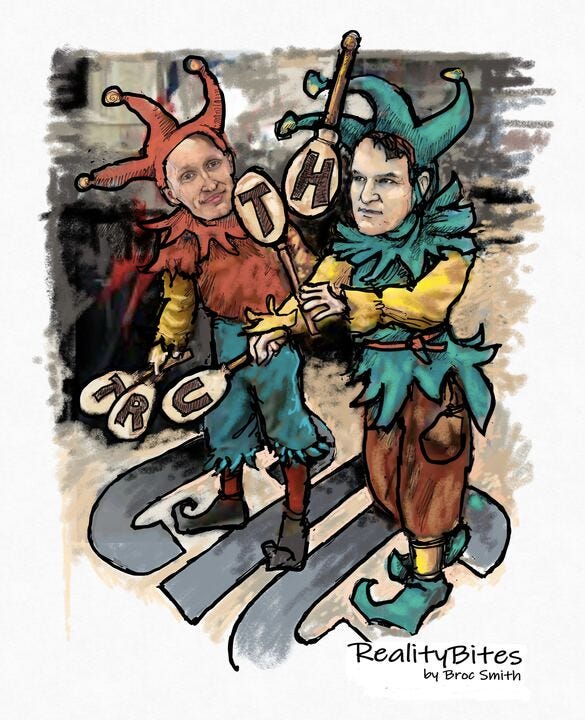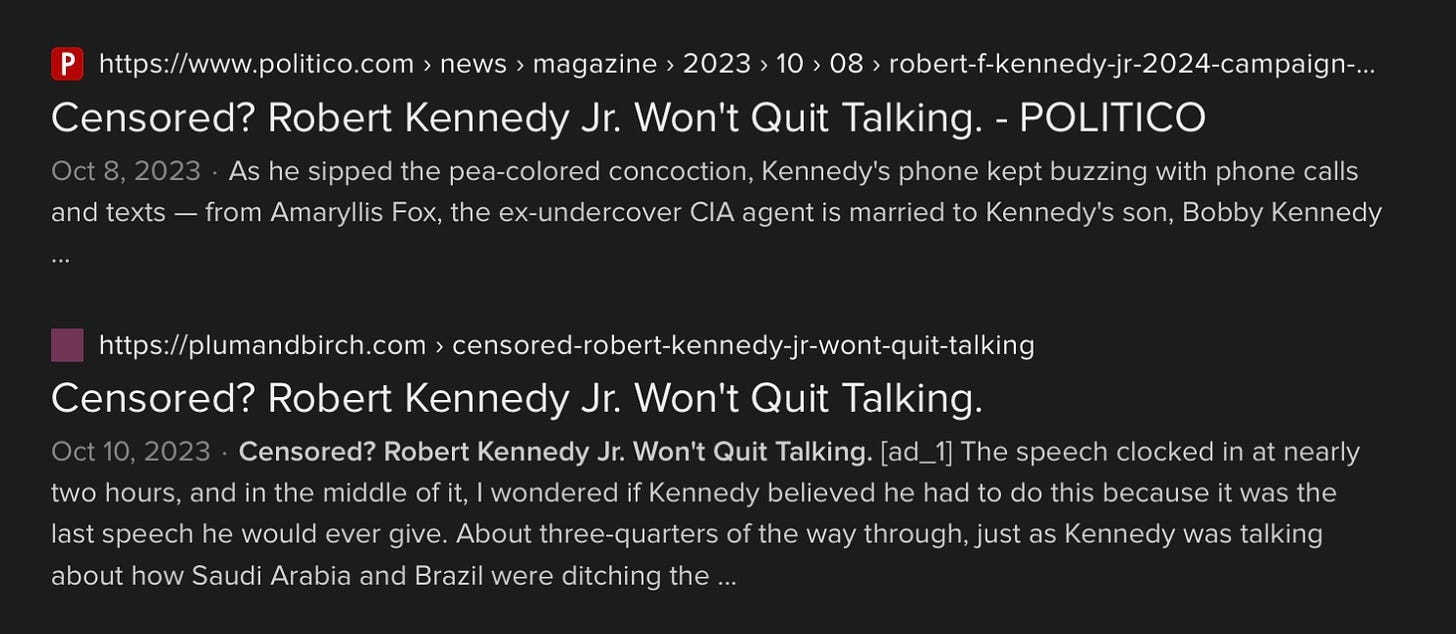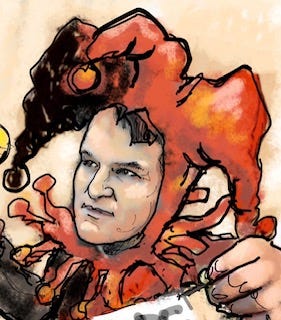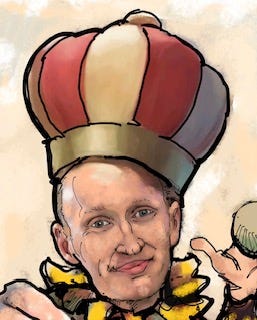Politico Reporters Say There is No Such Thing as Government Censorship
David Freedlander & Mark Scott Juggle Absurd Defense of Government Censorship
David Freedlander is a veteran freelance journalist who used a lengthy Politico “interview” with Robert F. Kennedy, Jr. to declare that there is no government censorship “as commonly defined.” Mark Scott, Politico’s Technology Correspondent, used a column to smear the journalists who revealed huge troves of evidence of government censorship, calling them “merchants” and their message “intoxicating.” Scott also wrote that the people he knows in Big Tech and officialdom are “honest, hardworking” and incapable of colluding to censor Americans.
On October 8, Politico published David Freedlander’s “RFK Jr.’s Ultimate Vanity Project” linked from a snarky search engine tagline “Censored? Robert Kennedy Jr. Won't Quit Talking.”
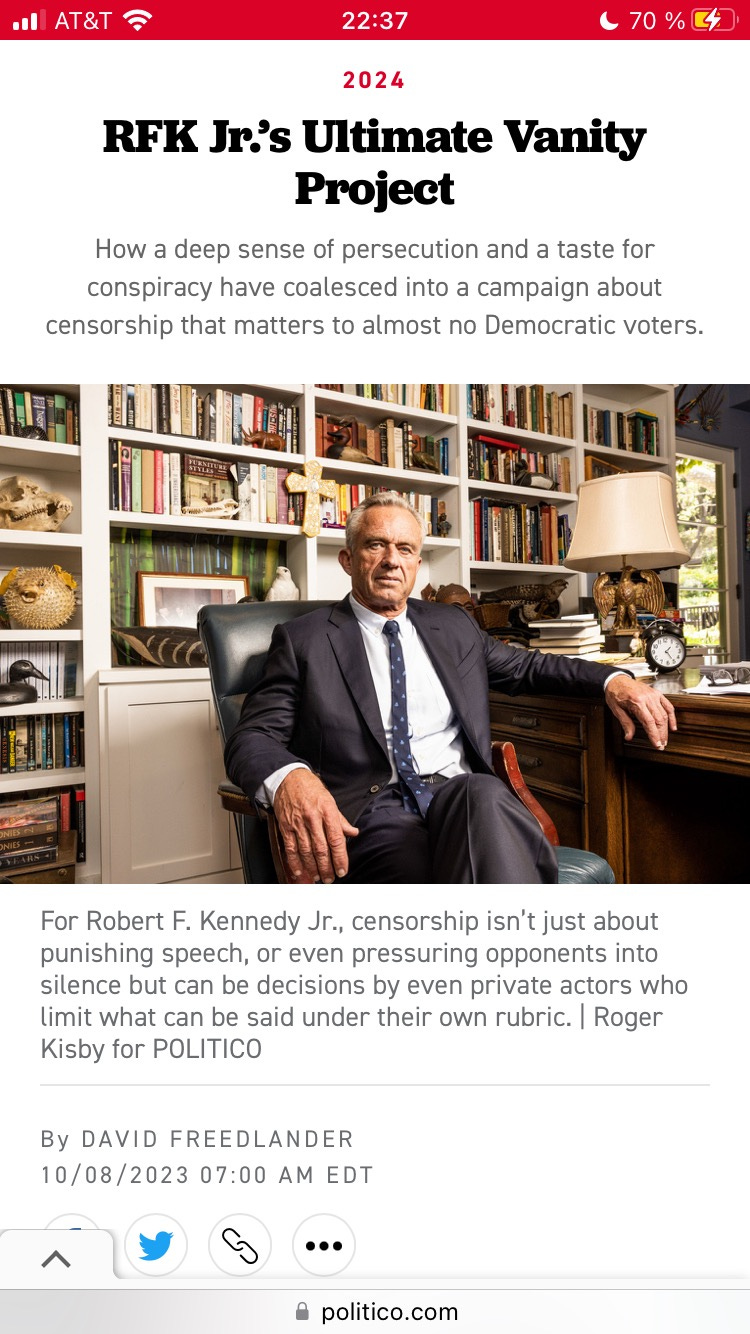
Meanwhile, Mark Scott’s inflammatory column published on September 28 overlooked evidence of government censorship just as Freedlander did in Politico, despite evidence like the Twitter Files and CTIL Files being some of the biggest stories in recent years.
Rather than investigate evidence of First Amendment threats, Freedlander & Scott sacrifice journalistic integrity to instead dismiss and ridicule a censored Presidential candidate, as covered by Reason, and leading reporters investigating government censorship, respectively. Politico editors appear to endorse this approach to First Amendment issues and the threat posed by government officials and social media platforms executives seeking to silence dissent and advance government-sanctioned narratives.
DAVID FREEDLANDER
When Freedlander’s piece went to press, censorship was well established as one of the top stories of 2023 and earlier. It was front and center in the explosive Hunter Biden laptop story, in Elon Musk’s shocking release of internal Twitter Files, in Kennedy’s highly-watched testimony before Congress, and in the high profile lawsuit Missouri v. Biden in 2021. Freedlander does not give credence to any of it.
“I suggested that presumably the government has as much right to flag suspect content as any other entity,” he cajoled Kennedy, “that no one was being killed or imprisoned for their statements or their views and that in fact there were more avenues to reach more people now than ever before.”
So as long as you are not murdered or placed in prison, you have free speech, according to Freedlander.
This description painted a grossly misleading picture surrounding government censorship, as well as Kennedy’s campaign. Nevertheless Politico’s editors signed off on a Freedlander “campaign profile” that dismissed or downplayed most of the compelling evidence of First Amendment violations, including against Kennedy himself.
“There really is no government censorship as commonly defined — that the government neither really coerces nor threatens private citizens or businesses,” Freedlander claimed in the Politico profile, playing a role more akin to a government defense attorney than a journalist interviewing a Presidential candidate – nevermind that Kennedy is an actual victim of that censorship.
Freedlander is simply wrong. On September 8, a month before Freedlander’s piece ran, the Fifth Circuit appellate court had ruled in Missouri v. Biden that officials from multiple federal agencies, including the White House, had “coerced” the social media platforms “to remove disfavored content and accounts from their sites.”
As The Hill commented at the time of the ruling, “acts of ‘coerced censorship’ by the platforms since early 2021 are now attributable to the federal government.” This historic court judgment is just a quick Google search away, but ignoring it is a case-in-point display of Politico’s irresponsible “journalism.” Freedlander and Politico failed to cite the Appellate Court determination and the fact that the case will now be heard by the Supreme Court.
When Freedlander calls Americans a “lavishly platformed population,” he overlooks that the crimes of censorship are then even more egregious when done under a shadowy guise of “content mediation” on social media than by governments directly. This method impacts an enormous pool of Americans who are subconsciously informed through these social networks every day. Furthermore, Freedlander and Politico reveal tone deafness to the censorship that also impacted their professional peers at Consortium News, The Federalist and the DailyWire, who have sued the Biden administration and NewsGuard for First Amendment violations.
“The problem for him (Kennedy) is that no one much seems to care,” writes Freedlander referring to the American electorate. This claim is belied by the fact that polls consistently show Robert F. Kennedy, Jr. – who has put censorship at the center of his campaign – as having significantly higher favorability ratings than both President Biden and President Trump.
MARK SCOTT
Less than two weeks before the aforementioned Freedlander piece was published, Politico’s Chief Technology Correspondent Mark Scott wrote a curt but revealing piece as to why Robert Kennedy, Jr., Michael Shellenberger and Matt Taibbi were testifying in House Committee hearings. Scott explains “why the concept of the so-called Censorship Industrial Complex is so appealing (but wrong) to those searching for answers about social media,” writing:
“In my years of reporting, I have rubbed shoulders with many of the officials, tech executives and outside groups that are allegedly part of the Censorship Industrial Complex. Almost all are honest, hardworking and trying to quell a surge in hateful and harmful online content. But few (to use a British-ism) would be able to organize a piss-up in a brewery, let alone an international conspiracy.”
Scott makes the mistake of apparently assuming that “honest” and “hardworking” people who are only intent upon quelling “hateful and harmful online content” cannot be misguided and support censorship. Scott also insultingly implies that they are just not competent enough to engage in such a conspiracy.
He also overlooks the fact that a conspiracy isn’t even necessary. These tech professionals have jobs because they know what is expected of them. They pull the levers when Big Government instructs them to do so, as the Twitter Files have painfully revealed. The same holds true for reporters who know what is expected of them in order to keep paychecks coming. Only highly principled and morally courageous voices can buck the system, reinvent themselves outside of the mainstream media, and make a living on platforms like Substack, Locals or Rumble.
Scott also calls Taibbi and Shellenberger “Horsemen” as if they and their peers are horrifically menacing, like the Bible’s “four horsemen of the apocalypse.” Scott calls them “Merchants” as if enriching themselves through the responsible practice of honest investigative journalism is a crime (quite ironic). Meanwhile, it needs to be noted that Taibbi and Shellenberger, despite being shunned by the corporate press, have struck a chord with Americans as half a million of people combined subscribe to their platforms.
Scott goes on to subtly deride the methodical case that Shellenberger, Taibbi and other independent journalists have built as “intoxicating” without undertaking a shred of substantive analysis or refuting a single claim. Even a cursory review of the Facebook leaks or the Twitter Files reveals that it is Big Government and Big Tech that have grown menacing, rather than Taibbi or Shellenberger. Unless of course, Scott and his “honest, hardworking” friends in the Censorship Industrial Complex have found themselves in their crosshairs.
Despite all of the mounting evidence of extensive censorship, including that of Robert F. Kennedy Jr. himself who was deplatformed from Instagram upon pressure from the Biden Whitehouse, Freedlander and Scott curtly scoff at the claims and avoid the evidence.
CONCLUSION
For Politico “censorship isn’t happening and no one cares.” It is in their denial of government censorship and its relevance to Americans that Politico has provided two textbook examples of journalistic malpractice in which the ideals and purpose of the Fourth Estate and First Amendment are betrayed.



